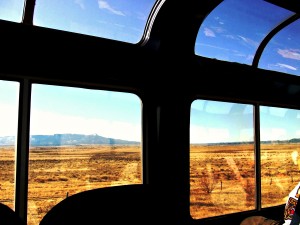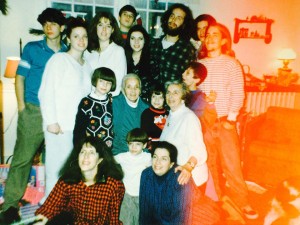I had lunch with a stranger once in the crowded food court of Union Station in D.C. There were no empty tables and only a few empty seats. When I saw a woman sitting by herself at a table, I asked if I could join her. She readily agreed.
I was in between trains, a Chicago-to-D.C. leg behind me and the rest of the journey home to Philadelphia ahead. Asking to join a stranger at their table is not within my standard mode of operation. Perhaps it was the 17 hours I had just spent on the train that inspired my unusual behavior.
On long-haul trains, if you go to the dining car you sit with people. And if, like me, you enjoy passing the hours of train travel in the observation car watching the country roll by, then you sit with people there too. On a long-haul train, you chat and really listen to the answers because you have all of the time and none of the cell signal. This slow-paced, low-pressure atmosphere makes my people-loving introvert-self bloom.
Between the trip out to Chicago and the ride back East, I spent almost 40 hours there-and-back talking to strangers. I met a man in the midst of his journey home from Thailand. He told me about an ex-wife and a child in Peru—how his world travels introduced him to people, but pulled them away too. He bought me a drink and we talked for hours as the view of the countryside gave way to midnight blackness. Eventually he asked me, “Are you happy?” I told him I was, mostly. He nodded, leaned back in his chair, and stared off into the darkness outside. His eyes had said more: that being happy was something he didn’t quite understand.
One morning after a few bumpy hours of sleep as the train chugged through Ohio and into Pennsylvania, I went to breakfast and was seated at a table with a woman. She asked me about my life. I asked her about hers. We lingered over our coffee as she told me about working with Catholic Social Justice groups in her teens, trying to end capital punishment. The fact that people still fight for the same thing today gave her mixed emotions. I told her about my Christian Social Ethics coursework—what I was learning about inequality and how the church participates. I told her it was encouraging to meet her. She said the same of meeting me.
 Seven-hundred miles of steel track is enough space for strangers to share many years of memories. You can settle in with wine or coffee. You can relax into the seat. The scenery of fields and small towns is buffer enough for the natural pauses. There is no hurry; your stop is likely states away.
Seven-hundred miles of steel track is enough space for strangers to share many years of memories. You can settle in with wine or coffee. You can relax into the seat. The scenery of fields and small towns is buffer enough for the natural pauses. There is no hurry; your stop is likely states away.
After joining fellow travelers for those many miles, to join a woman sitting at a table alone in a crowded food court seemed natural. As she told me about how she spends her days, the realization that she was homeless began to dawn on me. I took a second look at the food she had in front of her—one small order of fries. I told her I was finished eating and asked if she would like any of my leftovers. I think if I had thought about that a bit more, I would not have asked for fear of insulting her. She took my offer though and gladly ate what I did not. I eventually wished her a good day and a safe walk back to her night shelter, thanked her for allowing me to join her table, and went to board my train to Philadelphia.
This second-to-last last part of my journey was on a regional Amtrak train, which means smaller seats and less room to move about. My seat-mate told me about his job in the banking industry, seeming proud of his achievements as a district manager. Before long he had his laptop out, taking advantage of the Wi-Fi.
In Philadelphia, I switched from Amtrak to regional rail for the journey out to the suburbs, choosing a seat next to a woman who had on head-phones. The train car was silent but for the noise of the tracks and the intermittent stop announcements.
The transition was stark. Our day-to-day lives are not built for long chats and shared meals with strangers. Yet, people’s complicated lives exist even when we are just commuting home to the suburbs. Homeless people, lonely people, overlooked people. People who are on a journey to somewhere—people who fight for equality and people who wonder if it’s really possible to be happy—these people are always next to me.
It is of course easier to say that I want to engage than to actually engage. The meeting and eating and talking together requires intentionality on the part of all the participants. When I can remember that the people around me have stories of lives lived full of heartbreak and hope, then I am more willing to keep my eyes open for ways I can give. Even if what I have to give in the moment is only a listening ear or my not-yet-finished lunch.
* * * * *
 “Talking on the Train” was written by Nicole Morgan. Nicole’s first long-distance train trip involved Thanksgiving dinner with a dining-car table full of strangers. She booked a sleeper-car once and loved it for all its nostalgic charm, but much prefers coach class where there’s plenty of time and room to meet her traveling neighbors. Nicole writes about bodies, theology, and community at jnicolemorgan.com and tweets away @jnicolemorgan
“Talking on the Train” was written by Nicole Morgan. Nicole’s first long-distance train trip involved Thanksgiving dinner with a dining-car table full of strangers. She booked a sleeper-car once and loved it for all its nostalgic charm, but much prefers coach class where there’s plenty of time and room to meet her traveling neighbors. Nicole writes about bodies, theology, and community at jnicolemorgan.com and tweets away @jnicolemorgan




